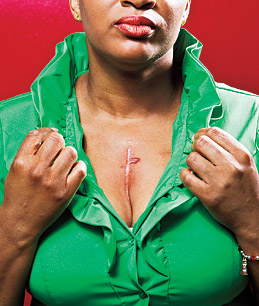
Suzie Arnegger calls it her drive-by heart attack. It was January 2004, and the 56-year-old insurance-claims adjuster had spent the previous six months bouncing back and forth among seven doctors and two hospital emergency rooms in San Diego seeking help for a pain that spread across her eyes and into her jaw. She was also nauseated and suffering from intestinal problems. All these symptoms led physicians to suspect everything from migraines to Ménière's disease to an inner-ear imbalance to menopause.
On a particularly bad morning, Arnegger got up early to visit a local urgent-care clinic. The center hadn't opened yet, so she began driving home. Stopped at a red light near a hospital and figured, What the heck, I'll go in. When she described her symptoms to the physician on call, he ordered some gastrointestinal tests and left the room. That's when Arnegger had her heart attack.
"My arms and legs went from tingling to numb. It was so fast — boom, boom, boom," she says. "It was so sudden and severe that the doctor said if I had been at home, I would not have made it."
But Arnegger did make it, and she's working hard to ensure that other women hear her story so that none have to experience the kind of runaround she did — one that ended only after her heart gave out. Now living in Plano, Texas, she is one of 465 graduates of a program — run by the Mayo Clinic and a group called WomenHeart — that trains heart-disease advocates.
Each year, 50 to 70 women gather for a four-day series of lectures and emotionally charged discussions with some of Mayo's leading heart specialists. The idea is to educate women and empower them to spread their newfound knowledge in their communities. "When you listen to the lectures, you're thinking, Whoa, I didn't know about all this," Arnegger says.
That's the point, says the symposium's leader, Dr. Sharonne Hayes, director of the Women's Heart Clinic at Mayo. When she and three heart-disease patients came up with the idea for the sessions in 2002, they had one goal: to awaken patients and doctors to the impact heart disease has on the 42 million American women currently living with it — and the families of the millions more who did not survive. Heart disease is the leading killer of women in the U.S., each year claiming more women than men. Yet most participants in that first class had never met another female heart patient, and most had harrowing tales like Arnegger's, of having their condition misdiagnosed or being dismissed by doctors who didn't think they could be suffering from heart disease.
That has changed, in small part because of the efforts of the WomenHeart champions, as the graduates are called, and in large part because of campaigns sponsored by the National Heart, Lung and Blood Institute and the American Heart Association. Most doctors are now aware that men and women have different symptoms when suffering a heart attack. Survivors like Arnegger are spreading that word and more by holding support groups at hospitals and in churches, as well as devising more tangible ways of advocating for the cause. Along with a fellow graduate of the Mayo sessions, in 2006, Arnegger launched Heart Scarves, a program in which women knit red scarves for patients undergoing heart procedures or recovering from heart disease. The pair now has hundreds of knitters clicking their needles to support the effort and raise awareness.